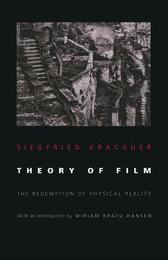
|
Theory of Film: The Redemption of Physical Reality
Paperback / softback
Main Details
| Title |
Theory of Film: The Redemption of Physical Reality
|
| Authors and Contributors |
By (author) Siegfried Kracauer
|
| Physical Properties |
| Format:Paperback / softback | | Pages:488 | | Dimensions(mm): Height 203,Width 140 |
|
| Category/Genre | Film theory and criticism |
|---|
| ISBN/Barcode |
9780691037042
|
| Classifications | Dewey:791.4301 |
|---|
| Audience | | General | | Tertiary Education (US: College) | | Professional & Vocational | |
|---|
| Edition |
Revised edition
|
| Illustrations |
64 halftones
|
|
Publishing Details |
| Publisher |
Princeton University Press
|
| Imprint |
Princeton University Press
|
| Publication Date |
14 December 1997 |
| Publication Country |
United States
|
Description
Siegfried Kracauer's classic study, originally published in 1960, explores the distinctive qualities of the cinematic medium. The book takes its place alongside works in classical film theory by such figures as Bela Balazs, Rudolf Arnheim, and Andre Bazin, among others, and has met with much critical dispute. In this new edition, Miriam Bratu Hansen, examining the book in the context of Kracauer's extensive film criticism from the 1920s, provides a framework for appreciating the significance of Theory of Film for contemporary film theory.
Author Biography
Siegfried Kracauer (1889-1966) was a German intellectual who wrote extensively on modern culture and everyday life. From 1924 to 1933 he was cultural editor of the Frankfurter Zeitung. He emigrated to the United States in 1941. He is the author of From Caligari to Hitler: A Psychological History of German Film (Princeton), The Mass Ornament: Weimar Essays and History: The Last Things Before the Last.
Reviews"Kracauer's profound theoretical investigation revealed film as the form that best captured the new modes of experience that characterize modernity. Miriam Hansen's brilliant introduction chronicles the work's genesis and transformation through Kracauer's conversations with Adorno and Benjamin, his flight from the Nazis, and his uneasy assimilation into the Cold-War United States."-Tom Gunning, University of Chicago "Just as new translations of Kracauer's early works have begun to reveal aspects of his intellectual project previously unavailable to readers of English, this most welcome new edition of Kracauer's magnum opus of media aesthetics will cast a new interpretative light on his later work, thanks especially to Miriam Hansen's highly illuminating introductory essay."-Thomas Y. Levin, Princeton University
|